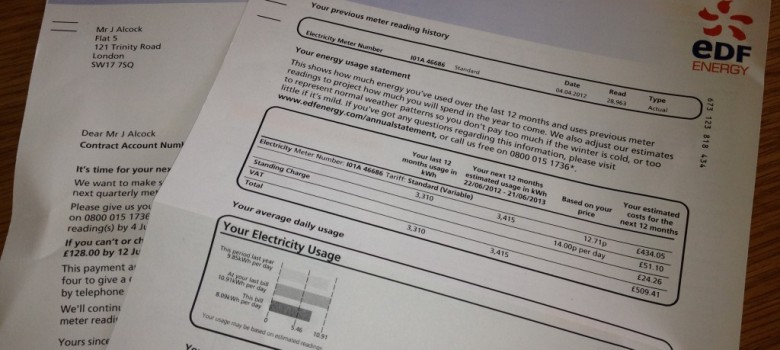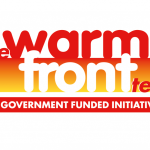
Fuel poverty means that 10% or more of your wage is spent keeping your home warm. In May 2012, the Government produced their fuel poverty report that highlighted 3.5 million people were living in fuel poverty during 2010. The report also forecasted 2011 and 2012 fuel poverty levels, predicting the total number would rise to about 4million, by the end of 2012.
A report released today by the Fuel Poverty Advisory Group estimates that the issue is far more pressing than the Government predicted with 300,000 more homes falling into difficulty this winter and the potential for millions of others to follow in the near future.
Fuel poverty is influenced by fuel prices, incomes and the energy efficiency of housing stock. All six of the big energy firms have either already raised their energy prices or have announced their planned increases, increasing energy prices by an average 7%.
With the economic situation as it is, aside from offering grants to help cover the fuel costs, the only viable course of action that the Government can take is to improve the energy efficiency of homes. In the sections below we describe the Government schemes available to homeowners and tenants each so people can hopefully avoid entering fuel poverty this winter
Initiatives that help cover the cost of your bills
The first two measures are short term and can really make a difference to lowering your energy bills, but don’t actually impact the energy efficiency of your home.
Warm Home Discount Scheme – energy companies setting aside funds to help their customers
This scheme is available to homes on low incomes and those vulnerable members of society to help them meet their energy costs. The funding is secured from the participating energy companies and given to two different groups of individuals: The core group and the broader group.
The core group of individuals is to receive a discount on their energy bills as long as they meet the following criteria, according to the DECC:
(i) Aged under 80 and receiving only the Guarantee Credit element of Pension Credit (no Savings Credit)
(ii) Aged 80 or over and are receiving the Guarantee Credit element of Pension Credit, (even if you get Savings Credit as well)
You may be in the broader group, where you don’t receive these benefits but you are as the government rightfully recognises: on low income; have long-term illness or are disabled, so need some help with energy costs.
So, what if I am in one of those groups, what do I do next?
If you are in the core group, you should receive a letter from the government telling you whether you are eligible to receive some help.
If you don’t receive a letter but still form part of the broader group, please speak to your energy provider who will take you through the application steps.
Winter Fuel & Cold Weather Payments – government helping those most vulnerable
There are two main benefits-linked payments that exist to help the vulnerable pay their energy bills during the winter months:
- Winter Fuel Payment,
- The Cold Weather Payment.
The main benefit is the Winter Fuel Payment, which according to the government website, may entitle you to between £100 and £300 tax-free funds to help with your heating bills.
So, what do I need to qualify?
Well, to qualify you need to have been born on or before 5 July 1951. You should get a Winter Fuel Payment automatically if you get the State Pension or another social security benefit, but not Housing Benefit, Council Tax Benefit or Child Benefit. You need to make one claim and you should get this allowance every year assuming your circumstances don’t change.
What happens next?
Most payments are made automatically now, between November and December, which means you should get help before Christmas. Also, different allowances will be paid out depending on your circumstances. For example if you are living together with someone who also qualifies, this payment may be halved as it is assumed you will be paying one heating bill.
…and when do Cold Weather Payments become relevant?
In addition, there is a ‘Cold Weather Payment’, which is enacted in special circumstances when there are successive cold days and heating needs to be turned up to maximum. There needs to be precisely seven or more recorded days where the thermostat is showing a temperature of zero degrees Celsius or below.
If you receive the following benefits: Pension Credit, Income Support, Jobseekers Allowance or an ESA you will be entitled to a £25 payment for every consecutive 7 days that the temperature is this cold.
Initiatives to improve the energy efficiency of your home
The next three initiatives actually improve the energy efficiency of your home which should help bring down your energy bills going forward.
Warm Front – helped 1000’s of homes become more energy efficient
The Warm Front is a scheme funded through the Carbon Emissions Reduction Target (CERT), which offers a grant of up to £3,500 to help homeowners install energy efficiency measures to reduce the running costs of their homes.
You can use the grant to help pay for loft insulation, draught proofing, cavity wall insulation, hot water tank / pipe lagging and heating systems. As long as the cost of the solution that you want to install within the home is covered by the grant you receive, you will not need to contribute any money to get the works completed.
So, how can I apply for this?
First of all, you need to fill out the application form to be assessed. The applicant needs to fulfil the following criteria:
- The applicant must live in their own home or rent privately, and be in receipt of one or more of the following benefits:
- Pension Credits
- Income Support or Income Based Jobseekers Allowance
- Income Related Employment and Support Allowance (ESA IR)
- Child Tax Credit and an income of £15,860 or less
- Working Tax Credit and an income of £15,860 or less
- In addition, the property that you live in must be poorly insulated and / or not have a working central heating system.
More information can be found here. However it is worth noting that this scheme is about to end its course by the end of March 2013 and to be replaced by the ECO (discussed below).
Now we look forward into 2013 and beyond and explore the measures that are set to improve energy efficiency in homes and small businesses up and down the country.
The Green Deal – set to be a game changer for energy consumption
Launched in October 2012, the Green Deal is an initiative that is set to dramatically improve the energy efficiency of all the homes in the UK. This initiative is available to all, as long as the energy efficiency measures suggested on your Green Deal report meet the ‘golden rule’ described later.
From January 2013, if you are a homeowner, landlord or tenant you can have the property assessed for the Green Deal and up to £10,000 invested to install various energy efficiency measures such as insulation, heating solutions or double glazed windows.
The benefit of this measure is that there is no up front cost if you are a home owner or tenant, but rather all the investment is paid back over 25 years through the energy bill. The measures such as floor and loft insulation will instantly save on your bills, which will be over and above the Green Deal charge.
So what are the next steps if you are a social housing tenant?
Make sure you speak to your council housing or housing association provider. If you would like to sign up to the Green Deal, it must be in agreement with your landlord. Ask your landlord if they have signed up for the Green Deal, which they are eligible to do now. Also speak to your neighbours about this and you can try and organise coordinated action, so the momentum for the Green Deal gathers pace!
Energy Company Obligation – additional help to the most hard pressed
Now, the Green Deal is underpinned by the ‘golden rule’ principle, which states that the cost to implement various energy saving measures must pay for by the estimated savings on the energy bills from having a more energy efficient home. But what happens if the golden rule is not met?
Well even if the golden rule is not met, the energy efficiency measures can be implemented anyway, via the Energy Company Obligation (ECO), provided eligibility criteria are met based on the two points below.
(a) Install energy efficiency measures to the low income and most vulnerable groups
(b) Provide energy efficiency to properties by installing solid wall insulation.
But, what happens next and how can I apply for this?
First of all you need to be in one of the lower income groups and what the DECC also defines as having more that 10% of your salary go to energy costs.
The precise details of this measure are still to be worked out. More information is coming though via the Energy Security and Green Economy Bill that will be making its way into parliament over the coming weeks. In essence it is meant to do what the Carbon Emissions Reduction Target (CERT) and the Community Energy Saving Programme (CESP) are doing right now, which is making sure that the big six energy providers ring fence an amount of spend each year to help out their ‘most in need’ customers.
So if you live in social housing, you need to make sure you speak to your landlord or association first and express your intention that you would like the property or the block you live in to be assessed for the Green Deal. If on the assessment your property doesn’t meet the ‘golden rule’, then you and your landlord need to take this up with your energy provider or the energy provider that services your block.
Again, it is very likely if the block of flats you live in doesn’t meet the criteria, then all the tenants will be in the same position and could benefit from this measure, which will bring down energy costs for everyone.
Help is there for those that want it
Fuel bill increases are not ideal, but unfortunately it seems like they are becoming a yearly occurrence, with five of the big six energy suppliers electing to increase their gas and electricity prices this winter (and E.ON announcing their increases for January 2013). These increased bills are hurting us all, but we hope the blog above has provided you with all the information you need to help reduce your energy bills. So you know what to do!














Just watching a report on BBC News – scary to think that many more people will be in fuel poverty this Christmas. Not sure that Energy companies care about their customers much or whether the government will do anything about these unfair prices people pay today!